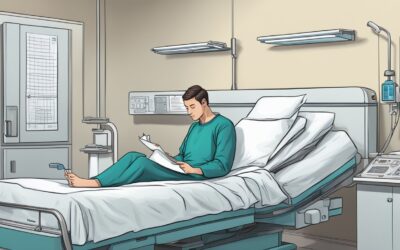Preparing for Hemorrhoid Banding Surgery: What You Need to Know
Preparing for hemorrhoid banding surgery can be a daunting experience, but with the right preparation and knowledge, it can be a smooth and successful process. Hemorrhoids are a common condition that affects many people, and banding is a popular treatment option. In this article, we will cover the basics of preparing for hemorrhoid banding surgery, including what to expect before, during, and after the procedure.

Understanding hemorrhoids and banding is crucial before preparing for surgery. Hemorrhoids are swollen veins in the lower rectum and anus that can cause discomfort and bleeding. Rubber band ligation, also known as banding, is a non-surgical procedure that involves placing a rubber band around the base of the hemorrhoid to cut off its blood supply, causing it to shrink and fall off. It is a safe and effective treatment option for many patients.
Preparing for surgery involves several steps, including scheduling the procedure, adjusting your diet and medications, and arranging for transportation. It is important to follow your doctor’s instructions carefully to ensure the best possible outcome. In the next section, we will go over the details of preparing for hemorrhoid banding surgery.
Key Takeaways
- Hemorrhoid banding is a popular treatment option for hemorrhoids.
- Understanding hemorrhoids and banding is crucial before preparing for surgery.
- Preparing for surgery involves several steps, including scheduling the procedure, adjusting your diet and medications, and arranging for transportation.
Understanding Hemorrhoids and Banding
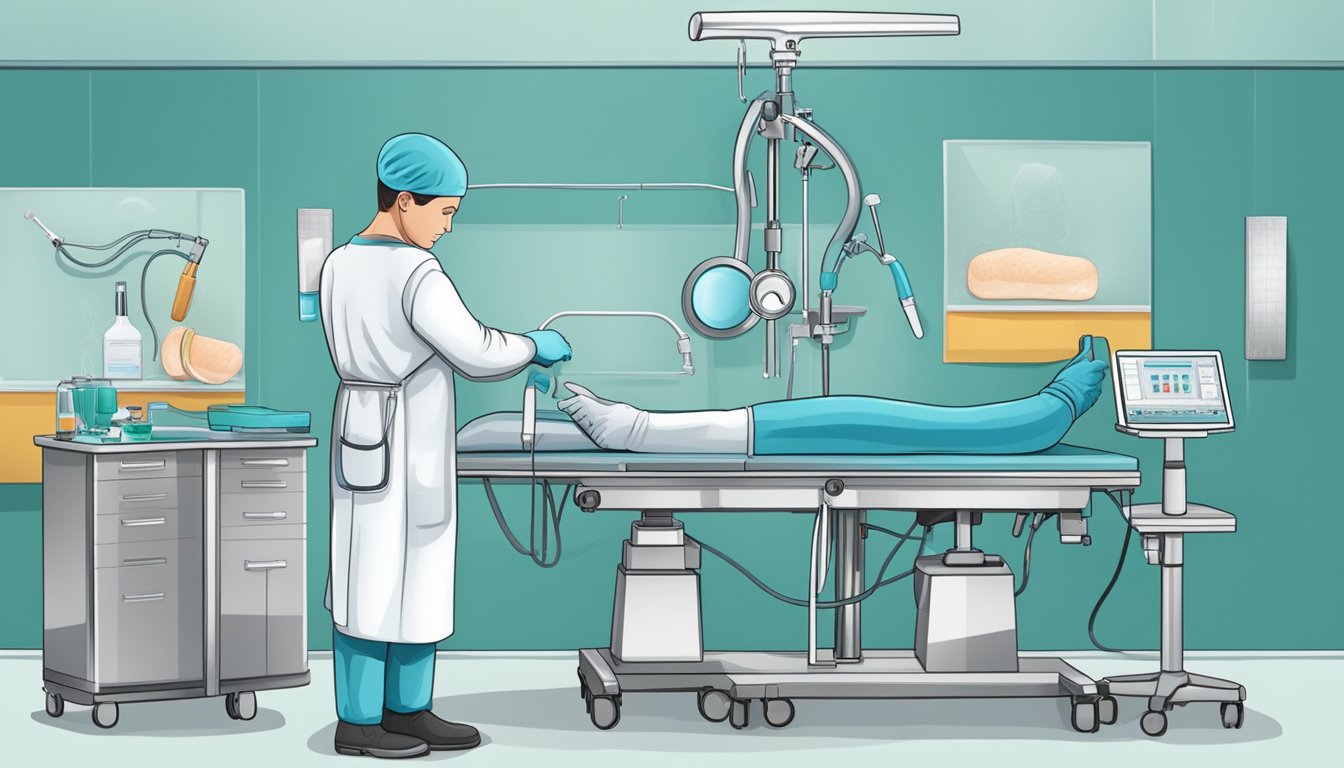
Hemorrhoids are swollen veins in the lower rectum and anus that can cause discomfort, itching, and bleeding. They can be internal or external, and sometimes both. Internal hemorrhoids are located inside the rectum and are not visible unless they protrude through the anus. External hemorrhoids are located outside the anus and can be seen or felt.
Types of Hemorrhoids
Internal hemorrhoids are classified into four grades based on their severity:
- Grade I: Small, non-prolapsing hemorrhoids that are not visible.
- Grade II: Larger hemorrhoids that may prolapse (protrude through the anus) during a bowel movement but retract spontaneously.
- Grade III: Prolapsing hemorrhoids that require manual reduction (pushing them back inside the rectum).
- Grade IV: Prolapsed hemorrhoids that cannot be manually reduced.
External hemorrhoids are usually less severe than internal hemorrhoids and are characterized by swelling, pain, and itching around the anus.
The Banding Procedure
Hemorrhoid banding is a minimally invasive procedure that involves placing a rubber band around the base of an internal hemorrhoid to cut off its blood supply. This causes the hemorrhoid to shrink and fall off within a few days, leaving a small scar.
The banding procedure is performed using an anoscope, a small tube with a light and lens that allows the doctor to see inside the rectum. The doctor uses a special tool called a ligator to place the rubber band around the base of the hemorrhoid.
Banding is usually done on an outpatient basis and takes only a few minutes to complete. It is a safe and effective treatment for internal hemorrhoids that do not respond to other treatments, such as dietary changes, topical medications, or sclerotherapy.
In conclusion, understanding the types of hemorrhoids and the banding procedure is important for anyone considering this treatment option. While hemorrhoids can be uncomfortable and sometimes painful, banding offers a safe and effective way to alleviate symptoms and improve quality of life.
Preparing for Surgery
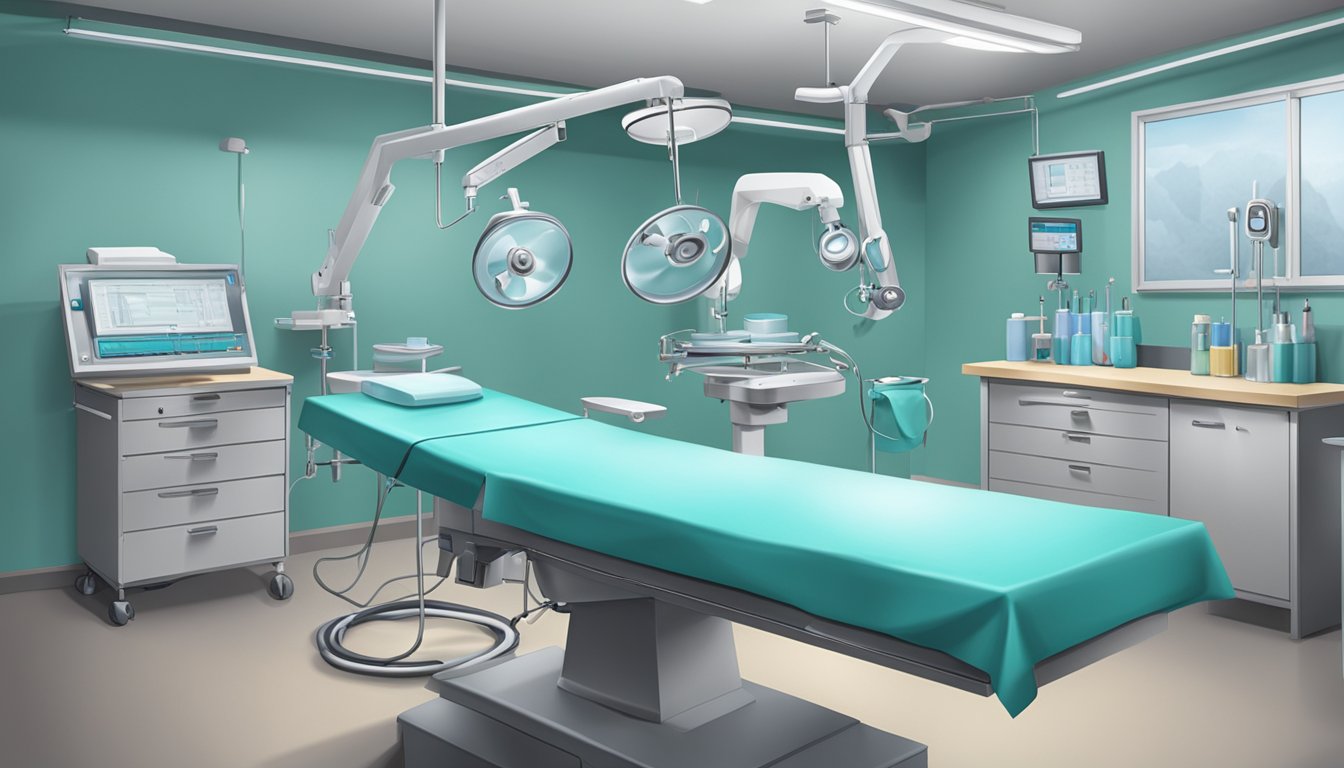
When preparing for hemorrhoid banding surgery, there are a few things to keep in mind to ensure a successful procedure and recovery. Here are some important aspects to consider:
Pre-Procedure Instructions
Before the surgery, our medical team will provide detailed instructions on what to do and what to avoid. It is important to follow these instructions carefully to minimize any potential risks and complications. Some of the instructions may include:
- Fasting for a certain period of time before the surgery
- Drinking plenty of fluids to stay hydrated
- Avoiding certain medications that can increase the risk of bleeding, such as aspirin and blood thinners
- Arranging for someone to drive you home after the surgery, as you may be groggy from the anesthesia
Dietary Adjustments
Making dietary adjustments can also help prepare for hemorrhoid banding surgery. Increasing fiber intake and drinking plenty of water can help soften stools and prevent constipation, which can worsen hemorrhoid symptoms. Some high-fiber foods include:
- Whole grains
- Fruits and vegetables
- Legumes
- Nuts and seeds
Medication Management
It is important to inform our medical team of any medications you are currently taking, including over-the-counter drugs and supplements. Depending on the medication, you may need to adjust your dosage or stop taking it temporarily before the surgery. Our medical team will provide specific instructions on medication management to ensure a safe and successful procedure.
In some cases, an enema or stool softener may be prescribed to help empty the bowels before the surgery. It is important to follow the instructions carefully and discuss any concerns with our medical team.
By following these guidelines, we can ensure a successful hemorrhoid banding surgery and a smooth recovery process.
The Day of Surgery

Anesthesia and Comfort
On the day of the hemorrhoid banding surgery, we will administer anesthesia to ensure that the procedure is painless. The type of anesthesia used will depend on the patient’s health status and personal preference. We will discuss the options with you beforehand so that you can make an informed decision.
After the anesthesia has taken effect, we will make sure that you are comfortable throughout the procedure. We will provide pillows and blankets to ensure that you are in a comfortable position. If you experience any discomfort during the procedure, please let us know so that we can adjust your position or provide additional pain relief.
During the Procedure
During the hemorrhoid banding procedure, we will use local anesthetic to numb the affected area. This will help to minimize any pain or discomfort that you may experience. We will also provide pain medicine if necessary.
After the procedure, you may experience some discomfort or pain. We will provide you with instructions on how to manage this discomfort, including taking pain medicine as prescribed. We may also recommend sitz baths to help reduce any swelling or discomfort.
It is normal to experience some gas after the procedure. This is a common side effect of the anesthesia and will usually resolve on its own. If you experience any fever or other symptoms after the procedure, please contact us immediately.
Overall, we will do everything we can to ensure that you are comfortable and pain-free during and after the hemorrhoid banding procedure. If you have any questions or concerns, please do not hesitate to ask us.
Postoperative Care

After hemorrhoid banding surgery, it is important to take proper care to ensure a smooth recovery. In this section, we will discuss the postoperative care that you should follow to manage discomfort, monitor for complications, and make lifestyle changes.
Managing Discomfort
It is common to experience some discomfort after hemorrhoid banding surgery. To manage this discomfort, we recommend the following:
- Take pain medication as prescribed by your doctor.
- Apply cold compresses to the affected area to reduce swelling and pain.
- Use sitz baths to help relieve pain and discomfort.
- Apply topical creams, such as hydrocortisone or witch hazel, to help reduce inflammation and itching.
Monitoring for Complications
While complications after hemorrhoid banding surgery are rare, it is important to monitor for any signs of infection or bleeding. If you experience any of the following symptoms, contact your doctor immediately:
- Excessive bleeding
- Severe pain
- Fever
- Difficulty passing urine or stool
Home Care and Lifestyle Changes
To aid in your recovery and prevent future hemorrhoids, we recommend the following home care and lifestyle changes:
- Eat a high fiber diet to prevent constipation and straining during bowel movements.
- Drink plenty of water to stay hydrated and soften stools.
- Avoid heavy lifting and strenuous activity for at least a week after surgery.
- Take stool softeners as prescribed by your doctor.
- Use topical treatments, such as creams or suppositories, as recommended by your doctor.
In conclusion, following these postoperative care guidelines can help ensure a smooth and successful recovery after hemorrhoid banding surgery. If you have any questions or concerns, do not hesitate to contact your doctor.
Understanding Risks and Complications
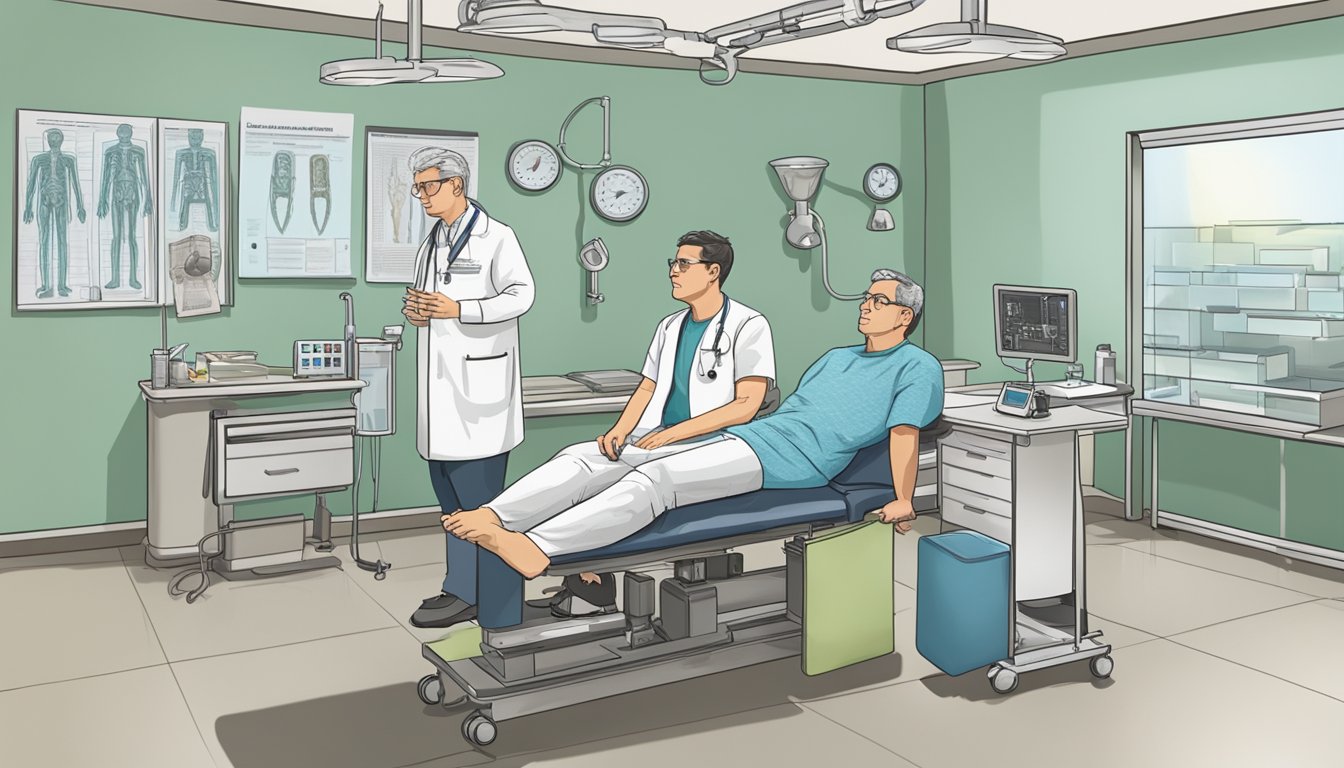
When considering any medical procedure, it is important to understand the potential risks and complications. Hemorrhoid banding surgery is no exception. While it is generally considered a safe and effective treatment for hemorrhoids, there are still some risks involved.
Common Risks
Some of the most common risks associated with hemorrhoid banding surgery include bleeding, infection, and blood clots. It is also possible to experience complications such as straining, swelling, and sepsis. While these risks are relatively rare, it is important to be aware of them so that you can take steps to minimize your chances of experiencing them.
When to Seek Medical Attention
While most people who undergo hemorrhoid banding surgery will experience a smooth recovery, there are some situations where medical attention may be necessary. If you experience excessive bleeding, severe anal pain, or problems urinating, it is important to contact your doctor right away. Other symptoms to watch for include itching, swelling, and anal stenosis.
Overall, hemorrhoid banding surgery is considered a safe and effective treatment for hemorrhoids. However, as with any medical procedure, there are some risks involved. By understanding these risks and knowing when to seek medical attention, you can help ensure a smooth recovery and minimize your chances of experiencing complications.
Alternatives and Advances

Other Treatment Options
While hemorrhoid banding surgery is an effective treatment option, there are other alternatives available. These include:
- Sclerotherapy: This involves injecting a chemical solution into the hemorrhoid to shrink it.
- Coagulation: This involves using a laser or infrared light to shrink the hemorrhoid.
- Supplements: Certain supplements, such as fiber, can help soften the stool and reduce the risk of constipation.
- Outpatient Procedures: Some procedures, such as rubber band ligation, can be performed in an outpatient setting.
It is important to discuss all treatment options with your healthcare provider to determine the best course of action for you.
Advancements in Hemorrhoid Treatment
In recent years, there have been several advancements in hemorrhoid treatment. Some of these include:
- Minimally Invasive Procedures: These procedures, such as stapled hemorrhoidopexy, use smaller incisions and result in less pain and a quicker recovery time.
- Medical Treatment: Certain medications, such as nonsteroidal anti-inflammatory drugs (NSAIDs) and pain relievers, can help manage hemorrhoid symptoms.
- Surgical Removal: In severe cases, surgical removal may be necessary to treat hemorrhoids.
- Infrared Photocoagulation: This involves using infrared light to coagulate the swollen veins, causing them to shrink.
- Antibiotics: If sepsis is present, antibiotics may be necessary to treat the infection.
As with any medical treatment, it is important to communicate with your healthcare provider and follow their recommendations. Maintaining good bowel habits, increasing fiber intake, and using stool softeners can also help prevent recurring hemorrhoids. Home remedies, such as sitz baths and ice packs, can also provide relief from swelling and discomfort. If you experience any severe symptoms, such as blood clots or diarrhea, seek medical attention immediately.
Overall, there are many options available for the treatment of hemorrhoids. By staying informed and working closely with your healthcare provider, you can find the best course of action for your individual needs.
Frequently Asked Questions
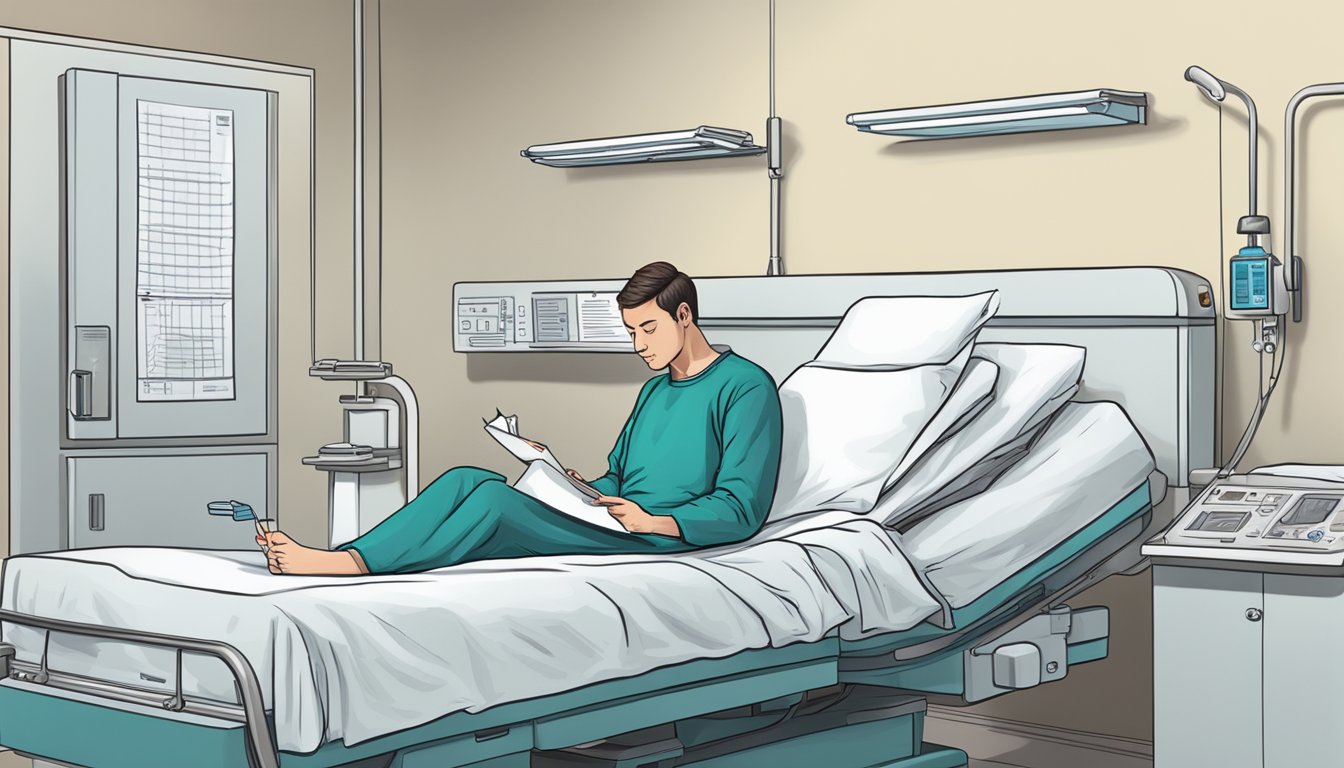
What are the potential complications associated with hemorrhoid banding?
As with any medical procedure, there are potential risks and complications associated with hemorrhoid banding. Some of the possible complications include bleeding, infection, pain, and difficulty urinating. However, these complications are rare and can often be prevented with proper post-operative care.
How does hemorrhoid banding compare to more invasive surgical options?
Hemorrhoid banding is a minimally invasive procedure that is typically less painful and has a shorter recovery time compared to more invasive surgical options such as hemorrhoidectomy. While hemorrhoid banding may not be suitable for all patients, it is often a safe and effective treatment option for those suffering from hemorrhoids.
What level of pain can be expected following hemorrhoid banding, and how can it be managed?
Most patients experience mild to moderate pain following hemorrhoid banding, which can usually be managed with over-the-counter pain medication. However, some patients may experience more severe pain, in which case stronger pain medication may be prescribed. It is important to follow your doctor’s instructions for pain management and to report any unusual symptoms or discomfort.
What should I do if the rubber band falls off prematurely after the procedure?
If the rubber band falls off prematurely after the procedure, it is important to contact your doctor immediately. This can be a sign of a complication, and your doctor will need to evaluate the situation and determine the best course of action.
How long is the recommended recovery period after undergoing hemorrhoid banding?
Most patients are able to resume normal activities within a few days of undergoing hemorrhoid banding. However, it is important to avoid strenuous activity and heavy lifting for at least a week following the procedure. Your doctor will provide you with specific instructions for your recovery period.
Are there any dietary restrictions or guidelines to follow prior to the hemorrhoid banding procedure?
Your doctor may recommend certain dietary restrictions or guidelines prior to the hemorrhoid banding procedure. This may include avoiding certain foods or beverages, or taking certain medications to help prepare your body for the procedure. It is important to follow your doctor’s instructions closely to ensure the best possible outcome.

